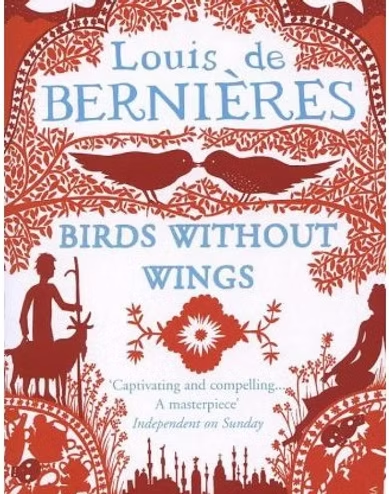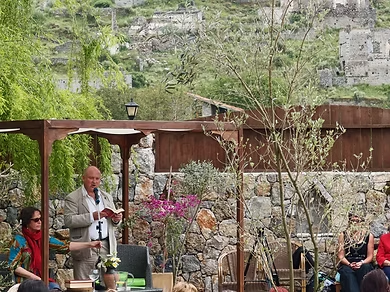A Ghost Town Remembered
Birds Without Wings’ is Louis de Bernieres’ sixth novel and is set in the fictional village of Eskibache, based on his impressions and experiences when visiting the nearby “ghost town ” of Kayakoy several years ago.
“. . . his portrayal of sleepy, multi-ethnic village life before, during and after the First World War is a magnificent achievement.”
– The Times
Placed against the backdrop of the collapsing Ottoman Empire, the Gallipoli campaign and the subsequent bitter struggle between Greeks and Turks, the book traces the fortunes of one small community in south-west Turkey, a town in which Christian and Muslim lives and traditions have co-existed peacefully for centuries.
When war is declared and the outside world intrudes, the twin scourges of religion and nationalism lead to forced marches and massacres, and the peaceful fabric of life is destroyed.
Philothei, a Christian girl of legendary beauty, and Ibrahim the Goatherd who has courted her since infancy are but two of the many casualties. With the end of a community that once transcended religious differences, their great love seems destined to end in tragedy and madness . . .
Here Louis reads a passage from his book, standing outside the Archangelos Mihal Taxiarhis church in the upper town.
These are the remains of the large house which Louis imagined as the home of one of the key characters from the book, Rustem Bey, and his concubine Leyla.
“The inner court was a sea of glimmering, moving golden-yellow lights. There was no pattern to it.
Some of the flames were momentarily still and others were travelling, meandering slowly among the lemon trees, the pots of pelargonium, oregano, mint and rose. It was as if the stars had been captured from Heaven and been set in motion there in that small square of the lower world. Leyla laughed with pleasure to see him so amazed.
‘I did it for you,’ she exclaimed. ‘I did it for you.’
Rustem Bey stepped forward and bent down to look. ‘By the Prophet,’ he exclaimed. Each light was the flame of a candle, and each candle was bourne on the back of an animal. ‘It’s wonderful,’ he said. ‘Where did you find so many tortoises?’
‘The children,’ said Leyla. ‘I got the children to go out and find them.’
‘It’s wonderful,’ repeated Rustem Bey. ‘I have never seen anything so pretty in all my life. You did this for me?’
‘Yes, my lion’.
‘My lion,’ he repeated. ‘You never called me that before.’
‘I have,’ she replied softly, ‘but not so as you would hear.'”
At the end of our guided walk through Kayakoy with Louis, he describes the expulsion of the Christian population from the town, and the confusion of the inhabitants, both those departing and those remaining.
“In their houses, the Christians attempted to deal with the bewildering and impossible task of working out what to take.
. . . It was one of those exceeding rare occasions when blessed indeed are the poor, for by far the greater proportion of the people lived in such straitened circumstances that there were relatively few choices to make.”
“And when the people came home from seeing the Christians leave . . . for days afterwards all you heard at night was the crying of the cats.
‘ . . . .and they were wandering about, distressed, crying that low moaning cry and some of them wailing, and it was a terrible sound and it was frightening and I lay on my pallet listening to them, and I couldn’t sleep, and I understood why they were crying in the great sudden loneliness and strangeness of the town, and that is what I remember more than anything else, the crying of the cats.'”




